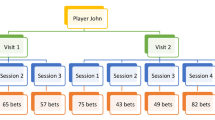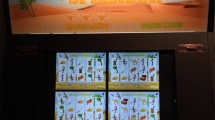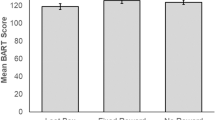Abstract
Negative wins refer to wins smaller than the original stake on a bet. Previous studies including large numbers of mandatory trials have shown that negative wins reinforce gambling intensity. We conducted an experimental investigation of the effect of negative wins on slot machine gambling intensity, game evaluation, and gambling beliefs based on a small number of mandatory trials/games. Participants were 92 (females = 57) undergraduate students (age range = 19 to 31, mean = 21.6, years) randomized to either an experimental (n = 43) or control (n = 49) group. They were instructed to play for a minimum of 50 trials and were each allocated 500 credits for placing bets. Participants in the experimental group were each exposed to a 30% negative win condition whereas the control group participants had no such exposure. All participants completed self-report questionnaires assessing demographic and gambling variables. In contrast to our hypotheses, the groups did not differ significantly on total bet size, mandatory phase (first 50 trials) bet size, number of bets placed after the mandatory phase, bet size variation, and remaining credits after the mandatory phase. Our findings indicate that with a small number of mandatory trials, negative wins do not reinforce gambling intensity, game evaluation, and gambling beliefs.

Similar content being viewed by others
References
Anderson, G., & Brown, R. I. F. (1984). Real and laboratory gambling, sensation-seeking and arousal. British Journal of Psychology, 75, 401–410.
Belisle, J., & Dixon, M. R. (2015). Near misses in slot machine gambling developed through generalization of total wins. Journal of Gambling Studies. doi:10.1007/s10899-015-9554-x.
Dixon, M. J., Harrigan, K. A., Sandhu, R., Collins, K., & Fugelsang, J. A. (2010). Losses disguised as wins in modern multi-line video slot machines. Addiction, 105, 1819–1824.
Dixon, M. J., Graydon, C., Harrigan, K. A., Wojtowicz, L., Siu, V., & Fugelsang, J. A. (2014). The allure of multi-line games in modern slot machines. Addiction, 109, 1920–1928.
Dixon, M. J., Collins, K., Harrigan, K. A., Graydon, C., & Fugelsang, J. A. (2015). Using sound to unmask losses disguised as wins in multiline slot machines. Journal of Gambling Studies, 31, 183–196.
Dymond, S., Lawrence, N. S., Dunkley, B. T., Yuen, K. S., Hinton, E. C., Dixon, M. R., et al. (2014). Almost winning: Induced MEG theta power in insula and orbitofrontal cortex increases during gambling near-misses and is associated with BOLD signal and gambling severity. NeuroImage, 91, 210–219.
Faul, F., Erdfelder, E., Lang, A. G., & Buchner, A. (2007). G* power 3: A flexible statistical power analysis program for the social, behavioral, and biomedical sciences. Behavior Research Methods, 39, 175–191.
Ferris, J., & Wynne, H. (2001). The Canadian problem gambling index. Ottawa, ON: Canadian Centre on Substance Abuse.
Harrigan, K., Dixon, M., MacLaren, V., Collins, K., & Fugelsang, J. (2011). The maximum rewards at the minimum price: Reinforcement rates and payback percentages in multi-line slot machines. Journal of Gambling Issues, 26, 11–29.
Haw, J. (2008). Random-ratio schedules of reinforcement: The role of early wins and unreinforced trials. Journal of Gambling Issues, 21, 56–67.
Hollander, E., Pallanti, S., Rossi, N. B., Sood, E., Baker, B. R., & Buchsbaum, M. S. (2005). Imaging monetary reward in pathological gamblers. The World Journal of Biological Psychiatry, 6, 113–120.
Jensen, C., Dixon, M. J., Harrigan, K. A., Sheepy, E., Fugelsang, J. A., & Jarick, M. (2013). Misinterpreting "winning" in multiline slot machine. International Gambling Studies, 13, 112–126.
Johansson, A., Grant, J. E., Kim, S. W., Odlaug, B. L., & Gotestam, K. G. (2009). Risk factors for problematic gambling: A critical literature review. Journal of Gambling Studies, 25, 67–92.
Kassinove, J. I., & Schare, M. L. (2001). Effects of the "near miss" and the "big win" on persistence at slot machine gambling. Psychology of Addictive Behaviors, 15, 155–158.
Livingstone, C., Woolley, R., Zazryn, T., Bakacs, L., & Shami, R. (2008). The relevance and role of gaming machine games and game features on the play of problem gamblers. Adelaide, South Australia: Independent Gambling Authority of South Australia.
Lole, L., Gonsalvez, C. J., Barry, R. J., & Blaszczynski, A. (2014). Problem gamblers are hyposensitive to wins: An analysis of skin conductance responses during actual gambling on electronic gaming machines. Psychophysiology, 51, 556–564.
Lyons, C. A. (2006). Methodological considerations in the experimental analysis of gambling. In P. M. Ghezzi, C. A. Lyons, M. R. Dixon, & G. R. Wilson (Eds.), Gambling: Behavior theory, research, and application (pp. 91–104). Reno, NV: Context Press.
MacLaren, V. V., Fugelsang, J. A., Harrigan, K. A., & Dixon, M. J. (2011). The personality of pathological gamblers: A meta-analysis. Clinical Psychology Review, 31, 1057–1067.
Mentzoni, R., Laberg, J., Brunborg, G., Molde, H., & Pallesen, S. (2014). Type of musical soundtrack affects behavior in gambling. Journal of Behavioral Addictions, 3, 102–106.
Parke, J., & Griffiths, M. D. (2007). The role of structural characteristics in gambling. In D. Smith, D. Hodgins, & R. Williams (Eds.), Research and measurement issues in gambling studies (pp. 211–243). New York: Elsevier.
Parke, A., Griffiths, M., & Irwing, P. (2004). Personality traits in pathological gambling: Sensation seeking, deferment of gratification and competitiveness as risk factors. Addiction Research & Theory, 12, 201–212.
Rossen, F. V., Clark, T., Denny, S. J., Fleming, T. M., Peiris-John, R., Robinson, E., & Lucassen, M. F. (2016). Unhealthy gambling amongst New Zealand secondary school students: An exploration of risk and protective factors. International Journal of Mental Health and Addiction, 14, 95–110.
Sagoe, D., Pallesen, S., Hanss, D., Leino, T., Molde, H., Mentzoni, R. A., & Torsheim, T. (2017). The relationships between mental health symptoms and gambling behavior in the transition from adolescence to emerging adulthood. Frontiers in Psychology. doi:10.3389/fpsyg.2017.00478.
Sharman, S., & Clark, L. (2015). Mixed emotions to near-miss outcomes: A psychophysiological study with facial electromyography. Journal of Gambling Studies. doi:10.1007/s10899-015-9578-2.
Steenbergh, T. A., Meyers, A. W., May, R. K., & Whelan, J. P. (2002). Development and validation of the gamblers' beliefs questionnaire. Psychology of Addictive Behaviors, 16, 143–149.
Walker, M. (2004). The seductiveness of poker machines. Gambling Research: Journal of the National Association for Gambling Studies (Australia), 16, 52–66.
Author information
Authors and Affiliations
Corresponding author
Ethics declarations
Conflict of Interest
The authors declare that they have no conflicts of interest.
Ethical Standards
The project received ethical approval from the Regional Committee for Medical and Health Research Ethics in Western Norway (2013/119/REK). All procedures adhered to the Declaration of Helsinki.
Informed Consent
Participants completed and returned informed consent forms prior to participation in the study.
Rights and permissions
About this article
Cite this article
Sagoe, D., Eide, T.A., Øhrn, H. et al. Negative Wins Do Not Reinforce ‘Short-Term’ Slot Machine Gambling Intensity, Game Evaluation, and Gambling Beliefs. Int J Ment Health Addiction 16, 917–927 (2018). https://doi.org/10.1007/s11469-017-9761-z
Published:
Issue Date:
DOI: https://doi.org/10.1007/s11469-017-9761-z




